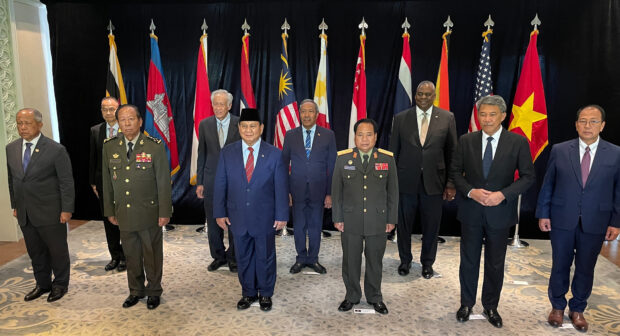Defense officials stress cooperation at Asia security meet

‘GOOD NEIGHBORS’ Acting Defense Secretary Carlito Galvez Jr. (extreme right) stands together with his counterparts from other countries, including US Secretary of Defense Lloyd Austin (third from right), for a commemorative photo at the start of the 20th Shangri-La Dialogue summit in Singapore. —AFP/SINGAPORE’S MINISTRY OF DEFENSE
SINGAPORE—Defense officials from Britain, Canada, the Philippines as well as China gathered here on Saturday at Asia’s top security summit, which US Secretary of Defense Lloyd Austin III also addressed in a speech highlighting the need for cooperation in the Indo-Pacific region.
Austin and his Chinese counterpart, Li Shangfu, met briefly on Friday at the opening dinner of the Shangri-La Dialogue. The two, however, “did not have a substantive exchange,” the Pentagon said. Li had earlier declined a US invitation for a meeting with Austin at the summit.
At its plenary session, Austin’s counterparts from Britain, the Philippines and other allies echoed his comments calling for cooperation, including among countries outside the Indo-Pacific.
Carlito Galvez Jr., senior undersecretary and officer in charge of the Philippines’ Department of National Defense, said increased competitiveness in the region has underscored the need for upholding the rule of law and pursuing dialogue.
‘Tilt’ toward region
“As the old adage goes, good fences make good neighbors,” Galvez said. “It is only when neighbors have clear boundaries and respect for set boundaries that relations remain genuinely amicable.”
Canada’s Defense Minister Anita Anand said “Canada has a keen interest in building a region that is stable, that is balanced.”
She added: “What does this mean? It means an Indo-Pacific where international rules and norms prevail and all actors engage responsibly, an Indo-Pacific where disputes are resolved peacefully, and ultimately an Indo-Pacific that is free, that is open and that is inclusive.”
A Chinese military delegate raised a question at the plenary on whether the presence of nations outside Asia was disruptive rather than constructive.
Ben Wallace, Britain’s secretary of state for defense, said his country would continue its Indo-Pacific “tilt.”
He added that the presence in Asia of member-states of the North Atlantic Treaty Organization was not out of line, since Russia “has been quite aggressive in this region …. It still retains quite a large naval fleet.”
Austin, in his remarks, reaffirmed Washington’s security commitments to the Indo-Pacific—including the Taiwan Strait dividing mainland China and the self-governing island of Taiwan and the South China Sea.
Ties between Washington and Beijing have become frayed over Taiwan, which China regards as its territory, and over the South China Sea, which Beijing also claims.
“To be clear, we do not seek conflict or confrontation. But we will not flinch in the face of bullying or coercion,” the Pentagon chief said, adding that “all of this is especially important in the Taiwan Strait.”
‘Security roadmap’
Austin also noted “the historic strides forward in the US-Philippine alliance.”
“With the Philippines, we’re negotiating a new security sector assistance roadmap that will bring our alliance into a new era,” he said in his speech posted on the website of the US Department of Defense.
Austin and other US officials have been working to shore up alliances in Asia to counter China. But the Pentagon said it is also seeking “meaningful military-to-military discussions at multiple levels to responsibly manage the relationship.”
A spokesperson of Li said “the US knows clearly why there are currently difficulties in military communication.”
Li, a general, has been sanctioned by the United States for buying Russian weapons in 2018.
Senior Col. Zhao Xiaozhuo, a member of the Chinese delegation, said removing the sanctions is “one of the preconditions for substantial talks” with Washington.
The Chinese delegation swiftly responded to Austin’s speech, which noted Beijing’s “alarming number of risky intercepts of US and allied aircraft flying lawfully in international airspace.”
The US defense chief also said that China “has been unwilling to engage more seriously on better mechanisms for crisis management between our two militaries.”
Senior Col. Tang Hefei, spokesperson of the Chinese Defense Ministry and also a member of the delegation, said Austin “made several false accusations.”
Zhao said the US had no business telling China what to do.
“What we do in the Chinese military is based on maintaining the core interests of China’s security, which is fundamental,” he told reporters.